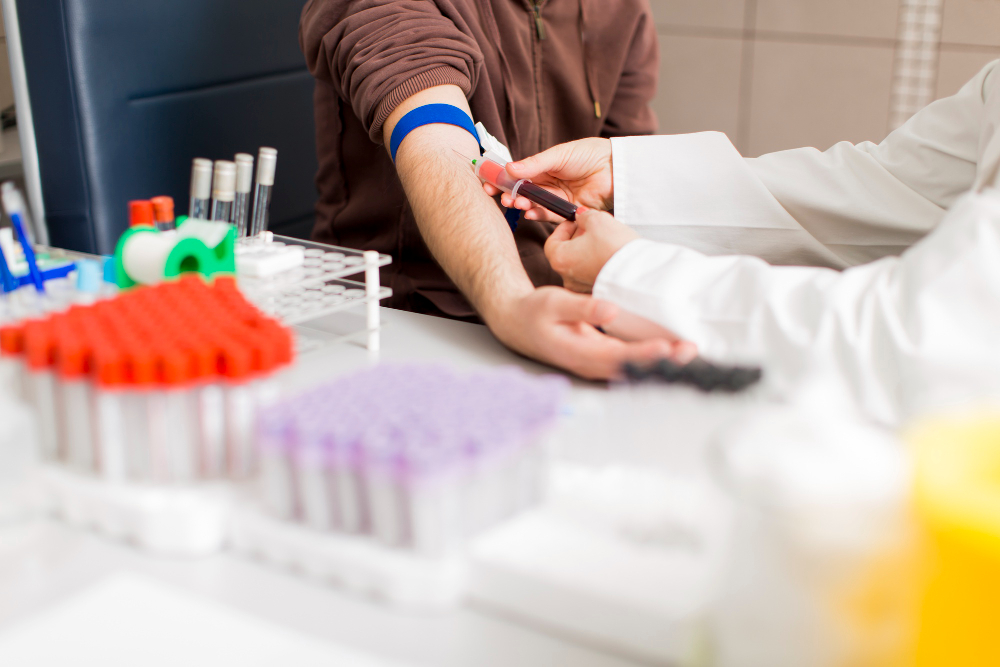- Fast results
- 4,000+ locations
- 4.8 star rating
Need Help? (888) GET LABS



Graves’ disease (GD) is what healthcare experts associate with the overstimulation of the thyroid gland. This is characterized by the excess production of thyroid hormones or hyperthyroidism. While it’s not necessarily a life-threatening condition on its own, untreated GD can become serious because of complications such as cardiovascular disease, osteoporosis, and thyroid storms. Learn more about the severity of Graves’ syndrome as you read on.
Graves’ disease, also known as exophthalmic goiter, results from hyperthyroidism, in which the thyroid gland secretes excessive amounts of thyroid hormones. It’s an autoimmune disorder, which means your immune system mistakenly attacks your cells due to a genetic malfunction. For this reason, the true cause of Graves’ hyperthyroidism remains unknown.
In terms of its link to the overstimulation of the thyroid gland, it is generally associated with the thyrotropin receptor antibody (TRAb). This antibody mimics the regulatory function of the pituitary gland, which regulates the secretion of thyroid hormones. As a result, it suspends the controls in the production of the hormones, leading to a hyperactive thyroid gland.
Nonetheless, the following symptoms are associated with GD:
| Did You Know? You can check the state of your thyroid hormones through thyroid function tests. These include screening for any abnormalities in the activities of hormones like T3 and T4, as well as the thyroid-stimulating hormone produced by the pituitary gland in the brain. Learn more about these hormones through our guide on understanding thyroid hormones. |
Although little is understood regarding the mechanism of Graves’ disease, the risk of developing the disease increases with the following factors:
| Did You Know? Smoking is a risk factor for various autoimmune disorders due to its role in compromising immunity. That said, people susceptible to these diseases are advised to quit smoking the right way. To ensure success, it helps to monitor the levels of nicotine that need to be detoxified from your body through a blood test for smoking. |

Symptoms of hyperthyroidism can be overlooked or mistakenly associated with other diseases. However, if you are at a higher risk of developing Graves’ hyperthyroidism, it’s crucial to consult your doctor regarding screening. Otherwise, the condition can escalate into the following complications.
Stroke, heart rhythm disorders, and even fatal heart failure are some of the most notable complications of untreated GD. In fact, the prevalence of de novo heart failure (type of heart failure among those without any medical history of heart disease) is at 5.4% among those with Graves disease.
| Did You Know? Your healthcare provider can evaluate your risk for osteoporosis. Also, this bone health problem, although common among women, does not exclude men. You can protect yourself from osteoporosis through proper screening and by being selective about the food you eat. |
While there is no cure for GD currently, treatment for the condition has been long placed to help patients live their lives without suffering from the symptoms. These treatment options include the following:
| Lifesaving tip: Treatment for GD is tailored to the severity of your illness and other health factors. While these treatment options are generally applied, your doctor will check for other medical conditions and overall wellness. That said, make sure to consult your healthcare provider for the diagnosis and treatment of Graves’ disease. |

Recovery from GD can be subjective, and research shows that remission varies based on the patient’s response to treatment. In most cases, those with GD carry the condition for the rest of their lives. However, the complications can be minimized through medication and therapy.
You can live a normal life even if you’re diagnosed with GD, provided that you stick to your treatment plan and consistently check with your healthcare provider, especially if symptoms recur frequently. Given that Graves’ syndrome is a lifelong condition, keeping track of your thyroid function, especially the overproduction of hormones, helps you take control of your health.
If not treated promptly, Graves’ disease can be fatal. While the condition itself does not pose any immediate threat to your health, keeping it untreated paves the way to complications that jeopardize your heart functions and bone health. It brings you closer to life-threatening conditions like stroke and heart failure.
Many aspects of living a full life can be disrupted by GD if you don’t seek immediate treatment. While symptoms of the condition can be easily associated with other diseases, it’s imperative to know your risk, such as having a family history of hyperthyroidism, a diagnosis of another autoimmune disease, and so on. To ensure you get tested for Graves’ disease, make sure you undergo a wellness checkup once a year, especially if you experience health problems.

© Copyright 2025 Personalabs. All Rights Reserved.